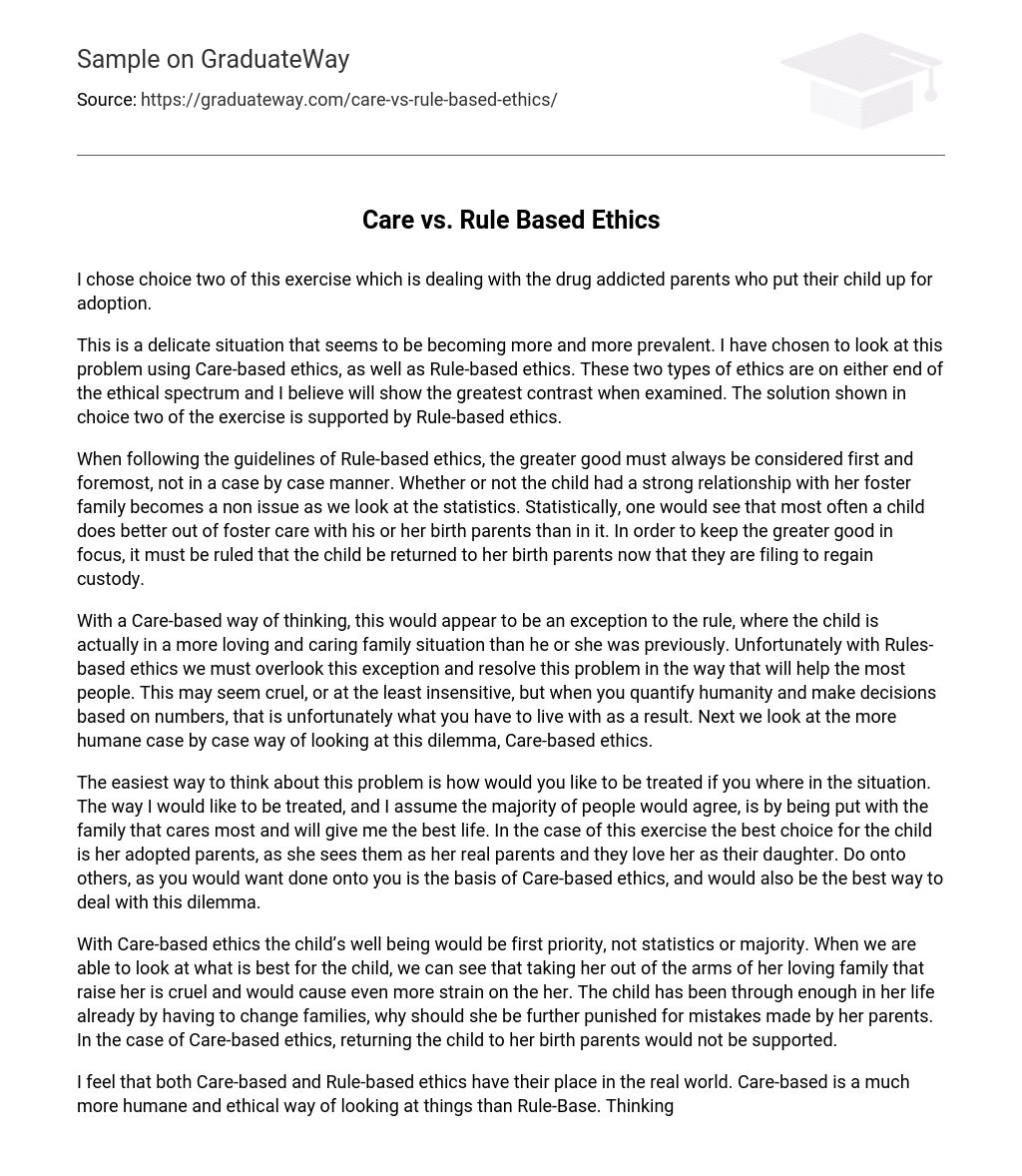I chose choice two of this exercise which is dealing with the drug addicted parents who put their child up for adoption.
This is a delicate situation that seems to be becoming more and more prevalent. I have chosen to look at this problem using Care-based ethics, as well as Rule-based ethics. These two types of ethics are on either end of the ethical spectrum and I believe will show the greatest contrast when examined. The solution shown in choice two of the exercise is supported by Rule-based ethics.
When following the guidelines of Rule-based ethics, the greater good must always be considered first and foremost, not in a case by case manner. Whether or not the child had a strong relationship with her foster family becomes a non issue as we look at the statistics. Statistically, one would see that most often a child does better out of foster care with his or her birth parents than in it. In order to keep the greater good in focus, it must be ruled that the child be returned to her birth parents now that they are filing to regain custody.
With a Care-based way of thinking, this would appear to be an exception to the rule, where the child is actually in a more loving and caring family situation than he or she was previously. Unfortunately with Rules-based ethics we must overlook this exception and resolve this problem in the way that will help the most people. This may seem cruel, or at the least insensitive, but when you quantify humanity and make decisions based on numbers, that is unfortunately what you have to live with as a result. Next we look at the more humane case by case way of looking at this dilemma, Care-based ethics.
The easiest way to think about this problem is how would you like to be treated if you where in the situation. The way I would like to be treated, and I assume the majority of people would agree, is by being put with the family that cares most and will give me the best life. In the case of this exercise the best choice for the child is her adopted parents, as she sees them as her real parents and they love her as their daughter. Do onto others, as you would want done onto you is the basis of Care-based ethics, and would also be the best way to deal with this dilemma.
With Care-based ethics the child’s well being would be first priority, not statistics or majority. When we are able to look at what is best for the child, we can see that taking her out of the arms of her loving family that raise her is cruel and would cause even more strain on the her. The child has been through enough in her life already by having to change families, why should she be further punished for mistakes made by her parents. In the case of Care-based ethics, returning the child to her birth parents would not be supported.
I feel that both Care-based and Rule-based ethics have their place in the real world. Care-based is a much more humane and ethical way of looking at things than Rule-Base. Thinking in terms of people and their lives almost always leads to a better and more caring result. On the other hand I do understand that Rule-based ethics has its place in society and sometimes the needs of the many do outweigh the needs of the few.
In a perfect world I would try to use Care-based ethics for most dilemmas, but unfortunately when viewing things realistically this would not be possible and Rule-based must be used in some instances.Out of the two types of ethics discussed, Aristotle would approve of the Care-based solution more than the Rules-based solution. Aristotle was a believer in becoming the best person you could be in order to achieve happiness and excellence of character. Care-based ethics is much more focused on the person and doing things that will appeal to your moral compass.
Care-based ethics also has a lot to do with making decisions based upon people’s happiness which is similar to some of Aristotle’s views.





